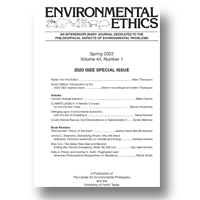|
|
|
1.
|
Environmental Ethics:
Volume >
46 >
Issue: 2
Allen Thompson
Notes from the Editor
view |
rights & permissions
| cited by
|
|
|
|
|
articles |
|
2.
|
Environmental Ethics:
Volume >
46 >
Issue: 2
Benjamin Steyn
Nature's Intrinsic Value:
A Taxonomy
abstract |
view |
rights & permissions
| cited by
Environmental ethicists often make claims about the intrinsic value of nature or parts thereof. Advances in intrinsic value theory, most notably Ben Bradley’s ‘Two Concepts of Intrinsic Value,’ successfully cleave the concept of intrinsic value into two: a Moorean and Kantian variety. This paper seeks to classify and organize different environmental theorists within a Bradley-inspired framework, helping to bring clarity and charity to the claims of older and newer environmental ethicists. These two types of intrinsic value help explain why different thinkers have differing intuitions on e.g., culling cases. As well as valuing nature suis generis, the paper considers the value that might accrue from other relational properties in nature, such as beauty, biodiversity, and rarity.
|
|
|
|
|
3.
|
Environmental Ethics:
Volume >
46 >
Issue: 2
Katie McShane
A Basis for Biocentric Equality?
abstract |
view |
rights & permissions
| cited by
Biocentric egalitarianism is the view that all living things share an equal fundamental moral status qua living things. In light of the well-known problems with past philosophical attempts to argue for this position, this paper proposes a way biocentric egalitarian claims might be understood and possibly vindicated. Relying on frameworks developed in recent discussions of the “basis of equality” in human-centered ethics, the paper argues that thinking of egalitarian claims as justified by (rather than as justifying) social ideals provides the best way of understanding the basis of biocentric egalitarian claims in environmental ethics. The paper first reviews arguments for biocentric egalitarianism and their central flaws and proceeds to survey different models for justifying egalitarian claims among humans. The paper argues the Social Ideal approach to justification is the one most likely to be helpful to biocentric egalitarians.
|
|
|
|
|
4.
|
Environmental Ethics:
Volume >
46 >
Issue: 2
Giacomo Floris, Costanza Porro
The Idea of Equality in Environmental Ethics
abstract |
view |
rights & permissions
| cited by
In recent decades, it has often been argued by environmental ethicists that human beings and the natural world ought to be considered as equals in some basic sense. The aim of this paper is to make sense of this view by examining what role, if any, the idea of equality ought to play in environmental ethics. Specifically, we have two aims: the first aim is to identify those environmental claims that are distinctively egalitarian. The second aim is to show these claims do not rest on a principled and convincing justification. Our main contention is therefore that equality has no place in environmental ethics. There are other promising ways to argue that our relationship with the natural environment must be fundamentally revised. By bringing clarity to this debate and dispelling the possibility of equality-based arguments, we hope to contribute to this endeavor.
|
|
|
|
|
special section: comments on darrel moellendorf's mobilizing hope |
|
5.
|
Environmental Ethics:
Volume >
46 >
Issue: 2
Dale Jamieson
Moellendorf on Hope, Poverty, and Climate Change
view |
rights & permissions
| cited by
|
|
|
|
|
6.
|
Environmental Ethics:
Volume >
46 >
Issue: 2
Katie McShane
Comments on Moellendorf’s Mobilizing Hope
view |
rights & permissions
| cited by
|
|
|
|
|
7.
|
Environmental Ethics:
Volume >
46 >
Issue: 2
Chris Armstrong
Poverty, Growth, and the Environment
view |
rights & permissions
| cited by
|
|
|
|
|
8.
|
Environmental Ethics:
Volume >
46 >
Issue: 2
Andrew Chignell
Hope, Wish, and Pessimism in Moellendorf's Mobilizing Hope
view |
rights & permissions
| cited by
|
|
|
|
|
9.
|
Environmental Ethics:
Volume >
46 >
Issue: 2
Katie Stockdale
Comments on Darrel Moellendorf, Mobilizing Hope
view |
rights & permissions
| cited by
|
|
|
|
|
10.
|
Environmental Ethics:
Volume >
46 >
Issue: 2
Darrel Moellendorf
Replying to Comments on Mobilizing Hope
view |
rights & permissions
| cited by
|
|
|
|
|
book reviews |
|
11.
|
Environmental Ethics:
Volume >
46 >
Issue: 2
David M. Frank
Ben Almassi, Reparative Environmental Justice in a World of Wounds
view |
rights & permissions
| cited by
|
|
|
|
|
12.
|
Environmental Ethics:
Volume >
46 >
Issue: 2
Ben Almassi
Olúfẹ́mi O. Táíwò: Reconsidering Reparations
view |
rights & permissions
| cited by
|
|
|
|
|
13.
|
Environmental Ethics:
Volume >
46 >
Issue: 2
Ryan Juskus
Alda Balthrop-Lewis. Thoreau’s Religion: Walden Woods, Social Justice, and the Politics of Asceticism
view |
rights & permissions
| cited by
|
|
|
|
